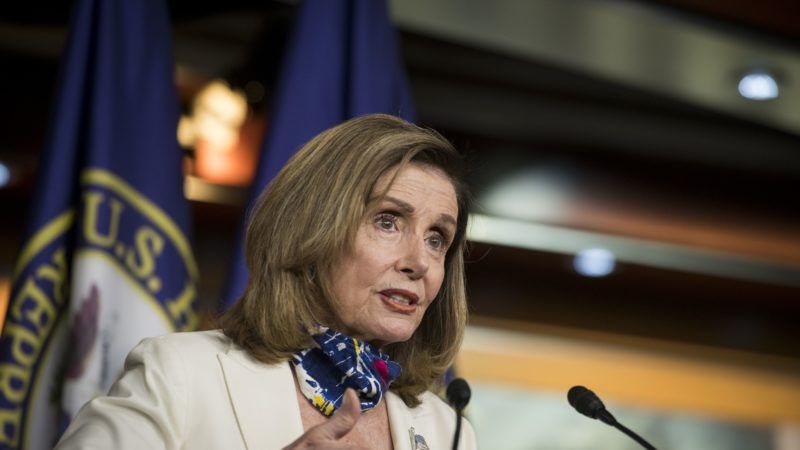As Airlines Begin Layoffs, Nancy Pelosi Promises Bailout
House Democrats are working to extend another round of emergency aid to airlines in a stand-alone bill after the passage of a larger coronavirus relief package stalled in the Senate.

Two major American airlines are threatening to cut roughly 32,000 jobs in the coming weeks unless Congress delivers another taxpayer-funded bailout—and Speaker of the House Nancy Pelosi (D-Calif.) is preparing to clear the runway.
In a statement on Friday, Pelosi called on airlines to delay planned layoffs that were scheduled to begin after a previous round of federal support expired. Pelosi said House Democrats were working to extend another round of emergency aid to airlines in a stand-alone bill after the passage of a larger coronavirus relief package stalled in the Senate.
American Airlines and United Airlines announced plans this week to slash 19,000 and 13,000 jobs, respectively, after the expiration of a $32 billion aid package passed in March. That bailout, part of the $3 trillion Coronavirus Aid, Relief, and Economic Security (CARES) Act, allowed airlines to tap into federal assistance as long as they kept at least 90 percent of their staff on payroll through the end of September.
With that deadline now passed and air travel still suffering due to the COVID-19 pandemic—passenger air traffic is running at roughly 30 percent of 2019 levels, Reuters reported on Friday—airlines are expected to cut unnecessary staff. But those layoffs create a political problem for congressional leaders and the Trump administration, neither of which want to see unemployment climb again in advance of the election. The airlines are seeking another $25 billion.
"An airline bailout is bad policy and bad use of taxpayers' money," says Iain Murray, vice president of the Competitive Enterprise Institute, a free market think tank.
Congress is trying to protect what Murray calls "legacy carriers," whose business models are anchored in business travel that no longer makes sense. A bailout, he says, obscures the simple truth that "air travel is not going to 'return to normal' anytime soon."
Despite that, even Republicans are trying to present the possible bailout as a fiscally prudent step. As Reason's Christian Britschgi highlighted last month, White House Chief of Staff Mark Meadows, the former chairman of the supposedly fiscally conservative House Freedom Caucus, has been pushing for more aid to airlines. Sen. John Cornyn (R–Texas) has also voiced support for an airline bailout bill—perhaps because he's running for reelection next month and represents a state where both American Airlines and Southwest Airlines are based.
But even if a bailout did make some degree of sense, the amount of money Congress is considering handing over to America's airline industry is far more than what should be needed to keep workers on the payroll.
Do the math, says Veronique de Rugy, an economist at George Mason University and Reason contributor. Even if the 32,000 workers getting furloughed each earned $100,000 annually, supporting their wages for six months would require about $1.75 billion—far less than the $25 billion bailout Congress is considering.
"In other words, the airlines are demanding more than 10 times more than is necessary to support 35,000 employees," writes de Rugy in an analysis published by the Mercatus Center, a right-of-center think tank. "These circumstances suggest that the proposed bailout would benefit largely shareholders and creditors, despite its ostensible purpose to help workers."


Show Comments (36)